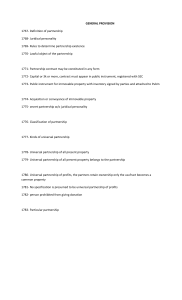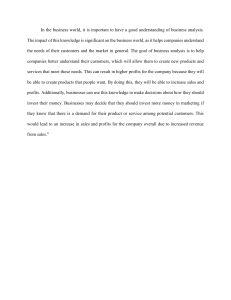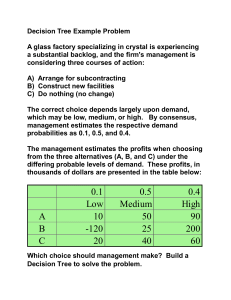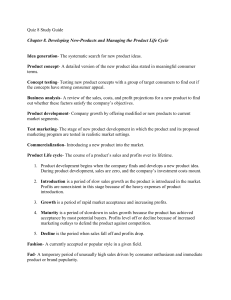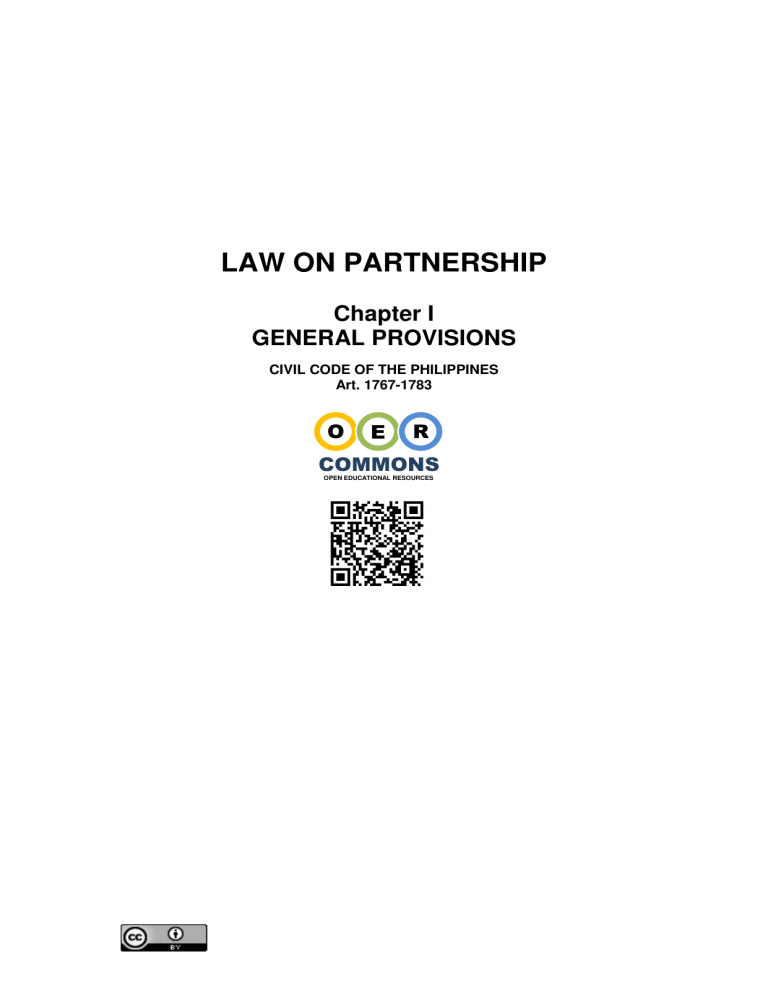
LAW ON PARTNERSHIP Chapter I GENERAL PROVISIONS CIVIL CODE OF THE PHILIPPINES Art. 1767-1783 O E R COMMONS OPEN EDUCATIONAL RESOURCES NS LAW ON PARTNERSHIP Article 1767 By the contract of partnership two or more persons bind themselves to contribute money, property, or industry to a common fund, with the intention of dividing the profits among themselves. Two or more persons may also form a partnership for the exercise of a profession. (1665a). NOMINATE There is a name given by the law Contract of Partnership: CONSENSUAL (meaning it is perfected by both parties) PERSONS Includes not only natural persons but also JURIDICAL persons. A corporation may NOT be a partner but it may engage in JOINT VENTURES. BIND THEMSELVES Must be capable and competent, meaning, the following may are not included: 1. Minors 2. Emancipated Minors 3. Those under civil interdiction – accessory penalty of being convicted of crimes 4. Insane persons 5. Incompetent persons (see oblicon notes) HOWEVER, if the person is only a SUSPECT, he may still bind himself into a contract since there is no final verdict yet. TO CONTRIBUTE MONEY, PROPERTY OR INDUSTRY Makes the contract onerous since this is MUTAL and ALL must give either one of the above Examples: 1. A and B create a partnership with a promise of contributing P10,000 each in cash. A gave his share while B gave a check worth P10,000. Is the issuance a contribution of money? No, unless the check is encashed. 2. Considering the same information above but with B contributing P10,000 in equivalent dollars. No, the contribution must be made using the legal tender, in this case, Philippine pesos. Property contributed may be movable, immovable or intangible property. (Ex: equipment, land, patents, etc.) If the partnership did not contribute money or property, then industry was contributed. Note: Contributions may differ for each of the partners. TO A COMMON FUND TO DIVIDE PROFITS AMONGST EACH OTHER The primary objective of partnerships is to make profits. Sharing profits need not be equal. Sharing ratios are determined by the partner’s agreement, and if there was no agreement, then the ratios will be based on the ratio of the partners’ contributions. Sharing ratios for losses will be the same as the sharing ratios for profits. The industrial partner shall NOT share in losses. rd The industrial partner is exempt only to the partners but not to 3 parties without prejudice to his right. A1816 CONSENT (DELECTUS PERSONAE) You can’t join a partnership without the consent of ALL partners. Why? Because the partnership will need to be dissolved before you are admitted and a new partnership will be made in its place. Article 1768 The partnership has a juridical personality separate and distinct from that of each of the partners, even in case of failure to comply with the requirements of article 1772, first paragraph. (n) Example If A and B form a partnership with X & Co., the property of X & Co. is not A & B’s property and likewise, A & B’s property is not X & Co.’s. Since X & Co is a juridical entity, it can acquire any property since the partners are merely agents. Thus the obligations of X & Co are not those of A & B’s. The partnership of X & Co can file against A & B and be sued by A & B, likewise, if a third party sues X & Co., A & B are not affected. The partnership will still be a juridical entity even without compliance with A1772. If X & Co. is exempted from certain things, it does not follow that A & B are included. Consequences of being a Juridical Person LAW ON PARTNERSHIP - Can sue and be sued Acquire any kind of property Insolvency of a partnership does not mean that the partners themselves are insolvent. Article 1769 In determining whether a partnership exists, these rules shall apply: (1) Except as provided by article 1825, persons who are not partners as to each other are not partners as to third persons. (2) Co-ownership or co-possession odes not of itself establish a partnership, whether such co-owners or co-possessors do or do not share any profits made by the use of the property (3) The sharing of gross returns does not of itself establish a partnership, whether or not the persons sharing them have a joint or common right or interest in any property from which the returns are derived (4) The receipt by a person of a share in the profits of a business is prima facie evidence that he is partner in the business, but no such inference shall be drawn if such profits were received in payment: (a) As a debt by installments or otherwise; (b) As wages of an employee or rent to a landlord (c) As an annuity to a widow or representative of a deceased partner (d) As interest on a loan, though the amounts of payment vary with the profits of the business (e) As consideration for the sale of a goodwill of a business or other property by installments or otherwise. (n) Provides the rule in determining partnerships Example for (1) If A & B say PUBLICLY that they are not partners, then according to A1825, if they told C that they are and C enters into a contract of partnership with them, then A and B are in a PARTNERSHIP OF ESTOPPEL. Example for (2) If A & B inherited land from their parents and subsequently leased the land out for P50,000/month, then it can be said that they share profits, but are they in a partnership? No, they are merely co-owners. The P50,000 profit is merely incidental and besides, it was not derived from BUSINESS OPERATIONS. If they bought the land for P1,000,000 each to build a house but instead opted to sell it for P2,500,000 then they have a profit of P500,000 but are they partners? No, because even if there was a profit of P500,000, this is merely incidental to the sale and not from business operations of A&B. If the land was instead used to build an apartment that is rented out? Yes, because A & B share profits from RENTING, this can be considered as ordinary business operations. Example for (3) If a person owns a big tract of land for planting rice and entered into an agreement with a farmer that they will divide the harvest, is the farmer partners with the owner of the land? No because of the following reasons: (1) The farmer had no contribution (2) The farmer has no say in the disposition of the land (3) The farmer has no say in management (4) In case of loss, the owner shall carry the entire burden and the farmer need not pay anything Example for (4) A partnership borrowed P50,000 and instead of giving the creditor a specific amount to be repaid, they agreed that the creditor will receive 1% of the partnership’s annual gross profit. Is the creditor a partner? No because the receipt of share in net income happens to be because of an existing debt. To determine whether a person is a partner: (1) Required contribution (2) Say in management (3) Share in losses Article 1770 A partnership must have a lawful object or purpose, and must be established for the common benefit or interest of the partners. LAW ON PARTNERSHIP When an unlawful partnership is dissolved by a judicial decree, the profits shall be confiscated in favor of the State, without prejudice to the provisions of the Penal Code governing the confiscation of the instruments and effects of a crime. (1666a) The partnership must have a lawful object or purpose Lawful object refers to CAPITAL Lawful purpose refers to the BUSINESS itself There must be common interest and benefit Unlawfulness of the partnership will cause it to be dissolved and profits shall be confiscated Example of unlawful purpose: GAMBLING A & B are partners where A contributed P100,000 in cash and B contributes gambling paraphernalia. They were raided and the gambling paraphernalia was confiscated. Can the P100,000 also be confiscated? No because the P100,000 was not the reason for the crime in anyway. The state is therefore required to return this amount to A. Legal effects of a Judicial Dissolution Partnership is considered void from the beginning Profit and instrument of the crime is confiscated The only returnable items are those that were never related to or connected with the crime committed Article 1771 A partnership may be constituted in any form, except where immovable property or real rights are contributed thereto, in which case, a public instrument shall be necessary (1667a) Can a partnership be created orally? Yes. A partnership may be constituted in any form (as stated in Article 1771) Partnerships are not covered by the Statute of Fraud since these are not necessarily required to be in writing (contract of partnership can be in any form) If immovable property and/or real rights are contributed to the partnership, then the contract must be in a public instrument (notarized documents) rd In order to bind 3 persons, the transfer of OWNERSHIP of immovable property MUST BE REGISTERED with the REGISTRY OF PROPERTY in the province or city where the property is located The article shows that partnerships can be perfected by MERE CONSENT. Article 1772 Every contract of partnership having a capital of P3,000.00 or more, in money or property, shall appear in a public instrument, which must be recorded in the office of the Securities and Exchange Commission. Failure to comply with the requirements of the preceding paragraph shall not affect the liability of the partnership and the members thereof to third persons. (n) If the partnership’s capital is P3, 000.00 or more (in any form), it must be in a public instrument, recorded with the SEC and note that property referred to here is MOVABLE since immovable property is covered by Article 1771. Failure to comply with the requirements of Article 1772 will not affect the liability of the partnership to rd 3 persons. Isn’t this inconsistent with Article 1358? No, remember that in Article 1358, if the contract terms exceed P500.00 then the contract must be in writing. This is merely for purposes of convenience and not validity or enforceability of the law. Also note that according to Article 1768, the partnership will still be valid and have a juridical entity. How do we reconcile this with Article 1358 and 1357? Article 1358 is for purposes of convenience and not for validity or enforceability of the law. Article 1357 states that contracting parties have the right to compel each other to place the contract into writing. Purpose of Registration: (1) Condition for obtaining a license to engage in business and in trade rd (2) 3 persons want proof that the partnership is existent, who the partners are and what the capitalization is before they enter into contracts/engage in business. (3) The government requires this so that tax liabilities may not be avoided (BIR) Failure to comply with the Article’s requirements will not prevent the formation of the partnership The Statute of Fraud will only apply if there was an agreement made by the contracting parties LAW ON PARTNERSHIP Example: A and B promise to contribute to their partnership money worth P10,000.00 each within one year from their agreement. A contributes early but when the time comes for B to contribute his share, he refuses to do so. Can A compel B to give his contribution? No, A cannot compel B to pay his contribution to the partnership. Why? Because the contract/agreement between the two parties was purely ORAL and never really written, and it has already been one year since they agreed to their contract terms. Article 1773 A contract of partnership is void, whenever immovable property is contributed thereto, if an inventory of said property is not made, signed by the parties and attached to the public instrument. (1668a) Refers specifically where one or both of the parties contribute immovable property. The requirements are: (1) The contract must be in a public instrument (2) An inventory of the immovable property must be made, signed by BOTH parties and attached to the public instrument, otherwise the partnership is VOIDED. Actual Case in Applying Article 1773: A and B agree to form a partnership engaging in a fish pond business where both partners will contribute cash; the cash is later used to buy land that is converted into a fish pond. C comes along and points out that the partnership is void because no inventory of the land was made. Is the partnership really void? No, the partnership is not void because according to the Supreme Court, Article 1773 need not apply since the land was BOUGHT from the CASH CONTRIBUTION. Suppose a partnership contributes immovable property but does not conduct an inventory and enters into a contract with A. The partnership does not fulfill its obligation to A and A sues the partnership. Was A right in suing the partnership? No, since the partnership was void from the beginning. A should instead file against the “partners” themselves. They will be sued under the legal basis of them being partners by estoppels, as stated in Article 1825. If A wishes to be in a partnership with B and promises to contribute land but subsequently sells the same plot to C, who immediately registers the transfer, who owns the land? C owns the land because A never registered the transfer. Estafa: when the owner of a property sells the same to two or more different persons. Article 1774 Any immovable property or an interest therein may be acquired in the partnership name. Title so acquired can be conveyed only in the partnership name. (n) Being a juridical entity, a partnership can acquire property and subsequently become its owner. Article 1775 Associations and societies whose articles are kept secret among members, and wherein anyone of the members may contract in his own name with third persons, shall have no juridical personality and shall be governed by the provisions relating to co-ownership. (1669) There is no juridical entity since the members can contract with 3 persons in their own name without binding others. In a partnership: (1) The partners are merely agents who cannot act alone (2) Articles of Partnership are known to ALL partners AND to the GENERAL PUBLIC. rd Article 1776 As to its object, a partnership is either universal or particular. As regards to the liability of the partners, a partnership may be general or limited. (1671a) Classifications of Partnerships: (1) As to the Object: (a) Universal Partnership of All Present Property – defined in Article 1778 (b) Universal Partnership of All Profits – defined in Article 1780 (c) Particular Partnerships – defined in Article 1783 (2) As to the Liability: LAW ON PARTNERSHIP (a) General – general partners are liable PRO-RATA and subsidiarily, sometimes solitarily, with their own property/assets if the partnership is insolvent. (may include industrial partners) (b) Limited – limited partners are liable only up to the extent of their contribution (3) As to Duration: (a) At will – no particular undertaking, can be dissolved at any time (b) With a Fixed Term – may only be dissolved upon the end of its term unless continued by the partners (4) As to Legality of Existence: (a) De Jure – complied with ALL requirements (b) De Facto – failed to comply with ALL requirements (5) As to Representation to Others: (a) Ordinary/Real – actually exists (b) Ostensible/by Estoppel – exists only to partners (6) As to Publicity: (a) Secret – some partners are not known to the public (b) Open/Notorious – all partners are known to the public (7) As to Purpose: (a) Commercial/Trading – business transactions (b) Professional/Non-Trading – exercise of professions Kinds of Partners: (1) Under the Civil Code: (a) Capitalist – contributes money/property (b) Industrial – contributes industry (c) General – liability extends to personal assets (d) Limited – liability up to contribution only (e) Managing – manages the partnership (f) Liquidating – responsible during dissolution (g) By Estoppel – not really a partner (h) Continuing – continues business after dissolution (i) Surviving – remains after partner’s death (j) Sub-partner – contracts with partners, Article 1804 (2) Other Classifications: (a) Ostensible – active, known to the public (b) Secret – active, unknown to the public (c) Silent – inactive, known to the public (d) Dormant – inactive, unknown to the public (e) Original – member at time of organization (f) Incoming – about to become a member (g) Retiring – about to withdraw Article 1777 A universal partnership may refer to all the present property or to all the profits. (1672) Article 1778 A partnership of all present property is that in which the partners contribute all the property which actually belongs to them to a common fund, with the intention of dividing the same among themselves, as well as the profits which they may acquire therewith. (1673) Article 1779 In a universal partnership of all present property, the property which belongs to each of the partners at the time of the constitution of the partnership becomes the common property of all the partners, as well as all the profits which they may acquire therewith. A stipulation for the common enjoyment of any other profits may also be made; but the property which the partners may acquire subsequently by inheritance, legacy or donation cannot be included in such stipulation, except the fruits thereof. (1674a) Why is the universal partnership of all present property not popular in the Philippines? Property owned at the time of contribution will become common property of the partnership eventually because only the profits acquired through the contribution will become common property, unless there was a stipulation that says otherwise. Example: A and B form a Universal Partnership of All Present Property and stipulate that property and profits that are acquired during business operations will become common property even if these were not due to their contributions and that if anyone inherits property, it will become common property as LAW ON PARTNERSHIP well. A acquires land as part of his compensation package from AyalaLand and B inherits land from his parents. Whose property will become common property? Only A’s land will become common property because it was essentially PAYMENT while B’s was inherited. The article prohibits donations to become common property, only fruits of such can become common property. In a partnership, contributions must be determinate/certain and partners are akin to donors. Donations cannot comprehend future property but profits can be stipulated. Article 1780 A universal partnership of profits comprises all that the partners may acquire by their industry or work during the existence of the partnership. Movable or immovable property which each of the partners may possess at the time of the celebration of the contract shall continue to pertain exclusively to each, only the usufruct passing to the partnership. (1675) Example: Suppose A and B form a Universal Partnership of All Profits and A wins in the lotto, P100,000.00. B tries to share in 50% citing the existence of their partnership and that A used the partnership’s money to purchase the lottery ticket. Can B really share in the lotto winnings? No, B cannot since it came from CHANCE, not WORK. If the P100,000.00 instead came from A’s work in DLSU, can B share in the profits of A? Yes, because it came from WORK. As long as it is PROFIT, the profit becomes common property to the partners UNLESS there was a stipulation in their agreement If A and B form a Universal Partnership of All Profits for a Taxi-Cab business and both contribute vehicles that will serve as the taxi, what they were actually contributing is the USE or the RIGHT TO USE their vehicles. Upon dissolution, the vehicles will be returned to them since there was never a transfer of ownership. Unique feature of the Universal Partnership of All Profits: The partners retain the title of ownership. Article 1781 Articles of Universal Partnership, entered into without specification of its nature, only constitute a universal partnership of profits (1676) If the articles of universal partnership are doubtful or unclear then the presumption is that it is a universal partnership of all profits. Because a universal partnership of all profits require less obligations and is less onerous since the partners get to retain ownership over the property that they contribute. Article 1782 Persons who are prohibited from giving each other any donation or advantage cannot enter into a universal partnership. (1677) A husband and wife cannot join a universal partnership. They are not allowed to donate to each other and a universal partnership essentially requires that the partners donate to each other. They can join a particular partnership instead. A partnership formed in violation of this article shall be null and void. It shall not have any legal personality either. Illustrative Case: A, B and C form a partnership to engage in the importation, marketing and operation of automatic phonographs, radios, television sets, amusement machines and their parts accessories, with B and C as limited partners. Subsequently, A and B got married and thereafter, C sold his share to A and B for a nominal amount. Was the partnership dissolved after the marriage of A and B and C’s sale to them of his share in the partnership? No, the firm was not a universal partnership but a particular one. Pertinent Legal Provisions (1) Article 87: Every donation or grant of gratuitous advantage, direct or indirect, between spouses during their marriage, valid or not, shall be void except moderate gifts which the spouses may give each other on the occasion of any family rejoicing. (2) Article 739: The following donations shall be void: (a) Those made between persons who were guilty of adultery or concubinage at the time of the donation LAW ON PARTNERSHIP (b) Those made between persons found guilty of the same criminal offense, in consideration thereof (c) Those made to a public officer or his wife, descendants and ascendants by reason of his office Article 1783 A particular partnership has for its object determinate things, their use or fruits, or a specific undertaking, or the exercise of a profession or vocation (1678) Defines what a particular partnership is Particular partnerships are those that are: Neither a universal partnership for all present property nor a universal partnership for all profits Example: Those that are formed for the acquisition and sale of property, Accounting Firms, Law Firms, etc. Popular because it is easy to join
